Recent decades have seen a spurt in various diseases. Economic development and the blind adoption of Western lifestyles are the reasons for the incidence of non-communicable (lifestyle) diseases. According to the World Health Organization (WHO), 60% of an individual’s health condition is determined by their day-to-day choices. These include diet, exercise, sleep, and stress levels. Today, liver diseases are a major health issue and are becoming very prevalent. Several ancient medical texts have mentioned the vital role of certain herbs that are claimed to have hepatoprotective qualities. Punarnava benefits for the liver have been very well-recognized by Ayurveda for treating jaundice and other liver-related disorders. Modern medical science has also acknowledged the importance of punarnava benefits for the liver. The article will look at the punarnava benefits for the liver in detail.
Also Read – Bhumi Amla Benefits for Liver: Rejuvenate Liver Naturally
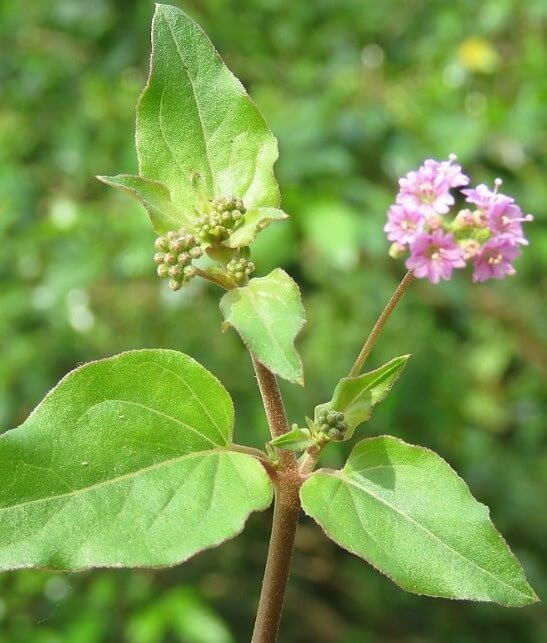
Image courtesy: Wikimedia.org
Punranava is a well-known medicinal plant in the Indian Ayurvedic medicine system.
In Ayurveda, punarnava means it can rejuvenate or renew the body and belongs to the rasayana category.
The botanical name of punarnava is Boerhavia diffusa.
It is also known by other names as red spiderling, spreading hogweed, or tarvine.
Other common names include santhi, moto satado, ataki, sanadika, gonajali, sothaghna.
The plant is native to Africa, Asia, North America, the Caribbean, South America, and the South Pacific.
This plant is a vine that grows naturally throughout the year but dries up in the summer.
It has small, thick leaves, tiny reddish-pink flowers, and gives fruits in the winter.
As per Ayurveda, punarnava is bitter and has a cooling effect on the body.
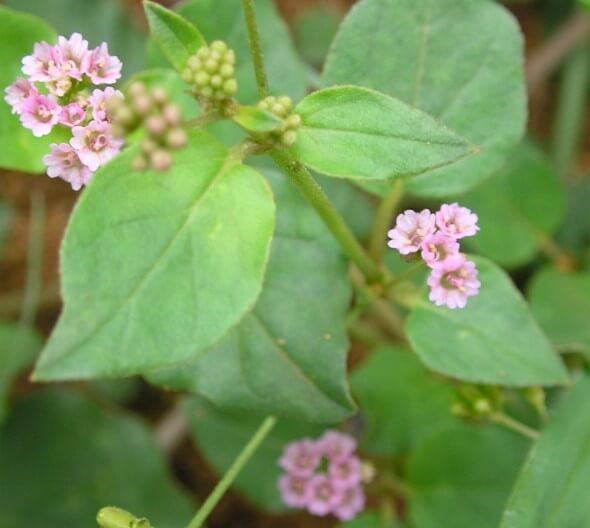
Image courtesy: flickr.com
The parts of punarnava that are used for medicinal purposes include whole herbs, roots, and seeds.
The plant’s importance can easily be understood by the fact that it is an essential ingredient in various Ayurvedic formulations.
Punarnava contains many important nutrients and natural compounds that are beneficial for human health.
Some of the nutrients which make Punarnava a valuable medicinal plant include:
1.) Macronutrients
- Carbohydrates – It contains a high amount of carbohydrates (10.56 mg/g). This provides energy, especially for the brain and nervous system.
- Proteins – It has a good amount of proteins (5.76 mg/g).
- Fats – Low content of fats (1.61 mg/g) in comparison to other plants.
2.) Minerals
- Magnesium – 142.9 mg/100g, it helps in lowering blood pressure and is essential for bone health.
- Calcium – 69.4 mg/100g, needed for bone formation, blood clotting, and muscle contraction.
- It contains Sodium (75.9 mg/100g) and Potassium (52.7 mg/100g), both crucial for water balance and acid-base balance in the body.
- Punarnava also contains small amounts of zinc, manganese, and iron.
3.) Vitamins
- Vitamin C (Ascorbic Acid) – 0.20 mg/g, an antioxidant that acts against aging and cancer, is also crucial for collagen and bone formation.
- Vitamin B1 (Thiamine) – 0.24 mg/g, converts carbohydrates into energy, needed for heart, muscle, and nerve function.
- Vitamin E (Tocopherol) – 0.16 mg/g, protects cell membranes from damage.
4.) Bioactive Compounds
Punarnava also contains many medicinally important bioactive compounds:
- Alkaloids
- Flavonoids
- Terpenoids
- Steroids
- Tannins
- Phlobatannins (only in ethanolic extract)
- Phenolic compounds, and
- Saponins
These compounds possess antioxidant, anti-inflammatory, anti-cancer, antispasmodic, antibacterial, and analgesic properties.
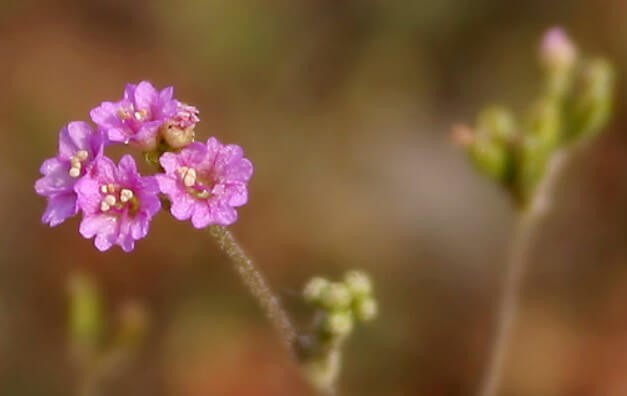
Image courtesy: Wikimedia.org
Conventionally, the roots of punarnava have been used by many tribal groups in India for hepatic disorders or liver diseases.
Several studies on punarnava have also established its crucial role in managing liver health that aligns with those mentioned in Ayurvedic texts.
Let us look at how Punarnava benefits liver health:
1.) Reduces Liver Enzyme Levels
Our liver produces certain enzymes and they are present in the liver cells.
These enzymes are essential for the normal functioning of the liver.
Only a small amount of these enzymes is found in the bloodstream when the liver is healthy.
However, if the liver is damaged, these enzymes leak from the liver cells into the bloodstream, increasing their levels in the blood.
Studies have shown that the punarnava extracts were able to bring down the enzyme levels significantly, especially in the case of liver injury due to toxins or alcohol.
Punarnava helps in lessening liver cell damage by reducing enzyme levels.
Punarnava benefits liver health by repairing and protecting it.

Image courtesy: freemalaysiatoday.com
Accumulating excess fats in the liver, particularly triglycerides and cholesterol, can lead to fatty liver.
Fatty liver disease can further deteriorate into more serious conditions like cirrhosis or liver failure.
Studies on punarnava have shown that it can reduce triglycerides, total lipids, and cholesterol levels in the liver.
Punarnava’s ability to lower fats helps prevent fatty liver.
It helps maintain a healthier balance of lipids in the liver cells, crucial for liver health.
Punarnava not only helps reduce fat levels in the liver but also lowers inflammation in liver tissues.
Animal studies have shown that animals treated with punarnava had fewer fatty deposits and less damage in their liver cells.
Too many deposits of fats in the liver – a condition of “fatty liver” or “hepatic steatosis” – cause serious long-term liver problems, especially if it is due to alcohol or fatty foods.
By reducing the fat buildup and inflammation, punarnava helps keep liver cells healthy and support proper liver functioning.
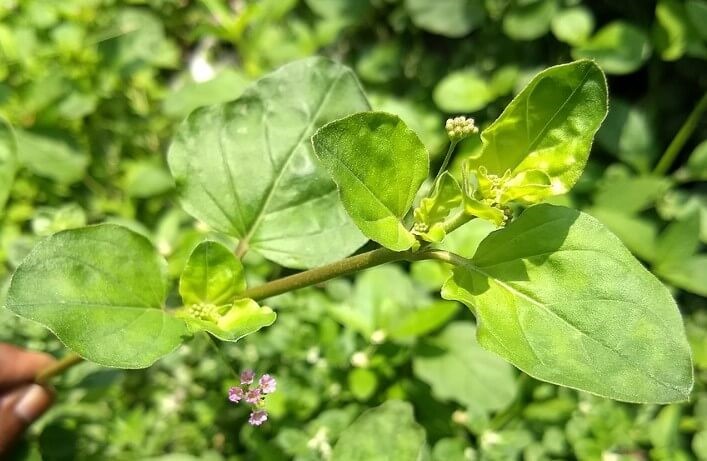
Image courtesy: Wikimedia.org
4.) Acts as an Antioxidant Defense
The liver is highly susceptible to oxidative stress.
This happens when free radicals – unstable molecules that damage cells – build up faster than the body’s natural mechanism to destroy them.
Punarnava extracts have been shown to enhance the activity of antioxidant enzymes in the liver.
These antioxidants protect the liver by neutralizing the free radicals, reducing oxidative stress, and preventing further damage to the liver cells.
This increase in antioxidants strengthens the liver’s capacity against toxins and supports recovery.
The liver’s primary function is detoxification.
It processes and neutralizes harmful substances in the body.
However, exposure to certain toxins like alcohol or drugs can cause serious damage to the liver.
Studies have shown that punarnava has protective effects against these toxins.
Punarnava has been shown to reduce liver enzyme levels and maintain better overall liver functions despite the liver’s exposure to harmful substances.
Punarnava benefits the liver by enhancing its detoxification capacity.
It also provides a protective shield against damage due to toxins.
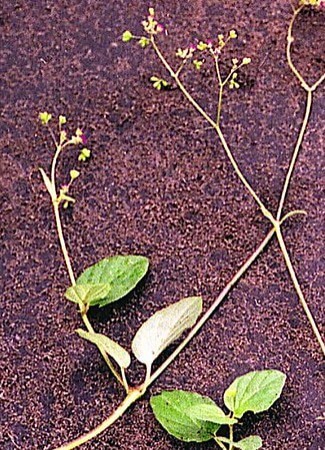
Image courtesy: flickr.com
One important function of the liver is the production of bile, a greenish-yellow fluid that helps break down fats during digestion.
Bile also plays a crucial role in the liver’s ability to remove toxins.
Studies on punarnava have shown that its extracts can increase bile production, promoting a smooth flow of bile from the liver.
The increased bile flow helps the liver carry out its detoxification process more efficiently and supports digestion.
Punarnava benefits liver health by keeping the liver’s processes balanced and functioning.
7.) Supports Blood Clotting Function
One of the many important responsibilities of the liver includes producing proteins necessary for blood clotting.
An impaired liver can lead to increased blood clotting times, creating a higher risk of bleeding.
A test, known as the prothrombin test, is done to determine how long it takes blood to clot.
A longer duration indicates impaired liver functions.
Studies on animals with liver damage have shown that punarnava shortens the time it takes the blood to clot.
This indicates that punarnava may help the liver make proteins for normal blood clotting, supporting healthy blood clotting function.
Punarnava contains many beneficial antioxidants and nutrients that benefit the liver’s health.
It contains phenolic compounds, flavonoids, vitamins C and E, and essential minerals like selenium and zinc.
These antioxidants and nutrients protect the liver cells from free radicals and damage.
They also enhance the liver’s natural regenerative capabilities, making it more resilient against stress and repair itself after injury.
The vitamins and minerals boost the liver’s protective abilities.
They also support its overall health by strengthening its immune function and cellular health.
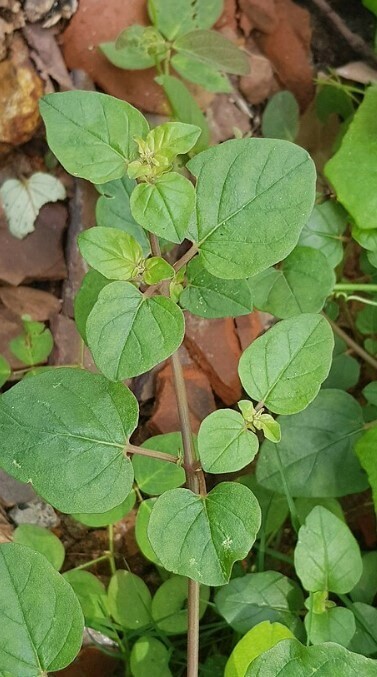
Image courtesy: Wikimedia.org
Many ayurvedic medicines for liver health contain punarnava as a major ingredient.
Punarnanva is available as juice, churna, capsules, and tablets.
These formulations are easily available in medical stores or online.
However, self-medication is not advisable.
It is better to consult an Ayurvedic practitioner to know the dosage, depending on your symptoms and doshas.
Ayurveda recommends avoiding taking punarnava during the period of breastfeeding and pregnancy.
Takeaway Message
Traditionally, many tribal areas use punarnava roots and whole plants as culinary ingredients.
This indicates that the nutritional importance of punarnava was a well-known fact to our ancestors.
Various studies on punarnava also suggest that the plant is a promising herb for multiple ailments including liver disorders.
Natural herbs have minimalist adverse reactions and are preferred by many over synthetic drugs for their long-lasting benefits.
If you are suffering from any liver-related ailment, it is best to talk to your doctor regarding your symptoms and how to include punarnava in your routine.
Disclaimer: The views expressed in this article should not be considered as a substitute for a physician’s advice. Please consult your treating physician for more details.
Ayurveda me punarnava ka mahatva purn sthan hai. Yah tridosh nashak hai. Iske bare me jankari achi lagi. Dhanyawad.
Thanks for your comments.
पुनर्नवा औषधि के रूप में इतना उपयोगी है यह पहली बार जाना। बहुत ही महत्वपूर्ण लेख।
Thanks a lot for your comments.